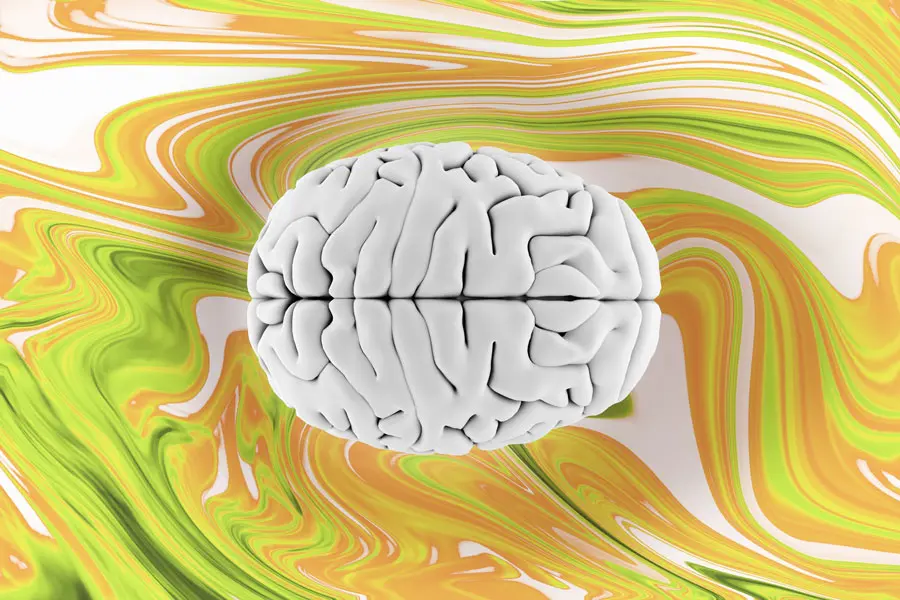For millions of people struggling with mental illness, psychedelic-assisted therapy could have an incredibly profound impact. However, the medical community is still working to discover how entheogens such as shrooms, LSD, and DMT actually affect the brain. For Canadian psychedelic life sciences company Cybin, the answers may lie in a helmet.
Cybin has entered into a partnership with Los Angeles-based neurotech company Kernel to leverage its breakthrough non-invasive wearable brain-imaging device—known as the Flow—for use in clinical trials. Cybin hopes to utilize the technology in the development of their psilocybin products meant to treat Major Depressive Disorder.
The Flow helmet is a cutting-edge neuroimaging system that provides real-time access to brain activity. The near-infrared spectroscopy system measures cognitive and neurologic activity during a psychedelic trip using “cortical hemodynamics to establish precise patterns of brain activity.”
In layman’s terms, light pulses from over 1,000 sensors across the helmet bounce off the brain to detect changes in blood flow. This information could be crucial to the advancement of effective psychedelic therapies as it will truly allow researchers to map a trip as it happens.
Read: Why More Therapists Need to Learn About Psychedelics—Now
“Access to Kernel’s innovative Flow technology adds another exciting dimension to the investigative work that Cybin is doing to develop breakthrough treatments for mental health disorders,” said Doug Drysdale, CEO of Cybin, in a press release.
“Currently, clinical investigators rely on limited subjective information from patients,” he continued. “The ability to collect quantitative data from our sponsored drug development programs is potentially game-changing in terms of our ability to measure where psychedelics work in the brain in real-time, and how we ultimately design our future therapeutics.”
How to Grow Shrooms Bundle
Take Both of Our Courses and Save $90!
In layman’s terms, light pulses from over 1,000 sensors across the helmet bounce off the brain to detect changes in blood flow. This information could be crucial to the advancement of effective psychedelic therapies.
The Flow helmet has already been used in a wide range of scientific studies covering topics from pain quantification to traumatic brain injury. Kernel founder and CEO Bryan Johnson, the tech guru behind Venmo, wanted his newest venture to continue to make an impactful change for generations to come.
“Cybin’s visionary approach to understanding and treating mental illness through psychedelic therapeutics opens a new frontier for addressing human health and wellness,” he stated in the release.
The team at Kernel has lofty goals of bringing Flow to consumer households by the 2030s. Psychonauts in the near future could engage in their own scans from the comfort of their homes, comparing and contrasting the effects of various types of entheogens in order to truly dial in their journeys. After all, individual brain chemistry—and dose—may vary, making this information valuable to people inside and outside scientific settings. In the meantime, the Flow helmet will only be used for research and development purposes.
For Cybin, it could be a major game-changer in their quest to be among the first providers of psychedelic therapies. The publicly-traded company, founded in 2020, aims to be at the forefront of “a complete transformation in mental health care.” Despite being relatively new, Cybin has hit the ground running; the company acquired fellow psychedelic biopharmaceutical firm, Adelia, not long after its inception.
Read: MDMA-Assisted Therapy is Less Effective if You Take Antidepressants
Psychedelic therapies are well on their way to becoming part of the mainstream, with the United States Food and Drug Administration (FDA) declaring psilocybin treatment to be “breakthrough therapy” in 2019 not once but two times, helping pave the way for trials in progress. An MDMA-assisted psychotherapy study received the same designation in 2017.
The race toward legal psychedelic treatments has biotechnology companies—and investors hungry for the next big thing—gearing up for what could be a multi-billion dollar industry within a few short years. But will space-age brain-scanning helmets be an obligatory part of your future trips? Time will only tell.

DoubleBlind is a trusted resource for news, evidence-based education, and reporting on psychedelics. We work with leading medical professionals, scientific researchers, journalists, mycologists, indigenous stewards, and cultural pioneers. Read about our editorial policy and fact-checking process here.

DoubleBlind Magazine does not encourage or condone any illegal activities, including but not limited to the use of illegal substances. We do not provide mental health, clinical, or medical services. We are not a substitute for medical, psychological, or psychiatric diagnosis, treatment, or advice. If you are in a crisis or if you or any other person may be in danger or experiencing a mental health emergency, immediately call 911 or your local emergency resources. If you are considering suicide, please call 988 to connect with the National Suicide Prevention Lifeline.



